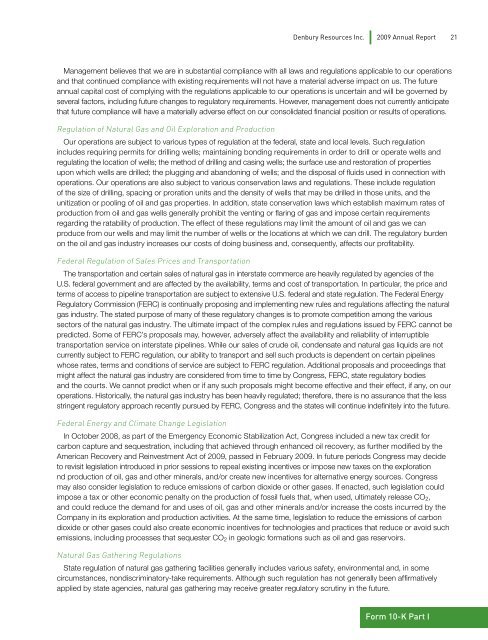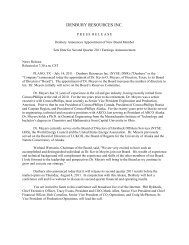Interactive 2009 Annual Report (PDF 7.56 MB) - Denbury Resources ...
Interactive 2009 Annual Report (PDF 7.56 MB) - Denbury Resources ...
Interactive 2009 Annual Report (PDF 7.56 MB) - Denbury Resources ...
- No tags were found...
You also want an ePaper? Increase the reach of your titles
YUMPU automatically turns print PDFs into web optimized ePapers that Google loves.
<strong>Denbury</strong> <strong>Resources</strong> Inc. <strong>2009</strong> <strong>Annual</strong> <strong>Report</strong> 21Management believes that we are in substantial compliance with all laws and regulations applicable to our operationsand that continued compliance with existing requirements will not have a material adverse impact on us. The futureannual capital cost of complying with the regulations applicable to our operations is uncertain and will be governed byseveral factors, including future changes to regulatory requirements. However, management does not currently anticipatethat future compliance will have a materially adverse effect on our consolidated financial position or results of operations.Regulation of Natural Gas and Oil Exploration and ProductionOur operations are subject to various types of regulation at the federal, state and local levels. Such regulationincludes requiring permits for drilling wells; maintaining bonding requirements in order to drill or operate wells andregulating the location of wells; the method of drilling and casing wells; the surface use and restoration of propertiesupon which wells are drilled; the plugging and abandoning of wells; and the disposal of fluids used in connection withoperations. Our operations are also subject to various conservation laws and regulations. These include regulationof the size of drilling, spacing or proration units and the density of wells that may be drilled in those units, and theunitization or pooling of oil and gas properties. In addition, state conservation laws which establish maximum rates ofproduction from oil and gas wells generally prohibit the venting or flaring of gas and impose certain requirementsregarding the ratability of production. The effect of these regulations may limit the amount of oil and gas we canproduce from our wells and may limit the number of wells or the locations at which we can drill. The regulatory burdenon the oil and gas industry increases our costs of doing business and, consequently, affects our profitability.Federal Regulation of Sales Prices and TransportationThe transportation and certain sales of natural gas in interstate commerce are heavily regulated by agencies of theU.S. federal government and are affected by the availability, terms and cost of transportation. In particular, the price andterms of access to pipeline transportation are subject to extensive U.S. federal and state regulation. The Federal EnergyRegulatory Commission (FERC) is continually proposing and implementing new rules and regulations affecting the naturalgas industry. The stated purpose of many of these regulatory changes is to promote competition among the varioussectors of the natural gas industry. The ultimate impact of the complex rules and regulations issued by FERC cannot bepredicted. Some of FERC’s proposals may, however, adversely affect the availability and reliability of interruptibletransportation service on interstate pipelines. While our sales of crude oil, condensate and natural gas liquids are notcurrently subject to FERC regulation, our ability to transport and sell such products is dependent on certain pipelineswhose rates, terms and conditions of service are subject to FERC regulation. Additional proposals and proceedings thatmight affect the natural gas industry are considered from time to time by Congress, FERC, state regulatory bodiesand the courts. We cannot predict when or if any such proposals might become effective and their effect, if any, on ouroperations. Historically, the natural gas industry has been heavily regulated; therefore, there is no assurance that the lessstringent regulatory approach recently pursued by FERC, Congress and the states will continue indefinitely into the future.Federal Energy and Climate Change LegislationIn October 2008, as part of the Emergency Economic Stabilization Act, Congress included a new tax credit forcarbon capture and sequestration, including that achieved through enhanced oil recovery, as further modified by theAmerican Recovery and Reinvestment Act of <strong>2009</strong>, passed in February <strong>2009</strong>. In future periods Congress may decideto revisit legislation introduced in prior sessions to repeal existing incentives or impose new taxes on the explorationnd production of oil, gas and other minerals, and/or create new incentives for alternative energy sources. Congressmay also consider legislation to reduce emissions of carbon dioxide or other gases. If enacted, such legislation couldimpose a tax or other economic penalty on the production of fossil fuels that, when used, ultimately release CO 2 ,and could reduce the demand for and uses of oil, gas and other minerals and/or increase the costs incurred by theCompany in its exploration and production activities. At the same time, legislation to reduce the emissions of carbondioxide or other gases could also create economic incentives for technologies and practices that reduce or avoid suchemissions, including processes that sequester CO 2 in geologic formations such as oil and gas reservoirs.Natural Gas Gathering RegulationsState regulation of natural gas gathering facilities generally includes various safety, environmental and, in somecircumstances, nondiscriminatory-take requirements. Although such regulation has not generally been affirmativelyapplied by state agencies, natural gas gathering may receive greater regulatory scrutiny in the future.Form 10-K Part I




